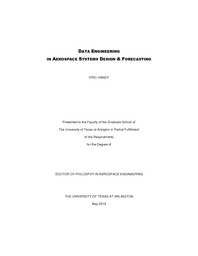| dc.description.abstract | Although engineers spend the majority of their time finding, managing, and transforming data, the process of how to handle data remains under-educated & under-researched. The alignment of engineering education & proficiency along an analysis-dominated mindset is ill-conditioned for the growing reliance on data-driven processes and holistic decision-making requirements. Although a majority of driving decisions in the aerospace industry rely heavily on utilizing existing organizational data-stores and built-in knowledge bases to make informed decisions, formalized development & implementation of data within existing engineering processes is seldom addressed.
The current research defines a complementary discipline, Data-Engineering, which seeks to capitalize on the exponential growth in availability of technical and socio-technical data to better inform aerospace decision-making. In particular, those design & forecasting decisions made early in the product development life-cycle are selected as the most impactful to the aerospace industry, as well as presenting the most under-exposed opportunity for improvement. This class of decisions presents unique challenges for forecasting situations with highly coupled technical & non-technical considerations. Adequately capturing market, environmental, political, social, & political issues alongside technical considerations is essential to advance the process of forecasting the total system capability & benefit of aerospace vehicle systems. The driving problems in aerospace for current and future generations of engineers will all require significant up-front investments of time, fiscal & human capital, and are therefore beholden to quality forecasting.
The primary contribution of this research has been the specification & development of Data-Engineering software system, designed to support aerospace design & forecasting efforts. Specification for the Data-Engineering System has extracted best-practices from existing fields – data and data system standards from information sciences, data-model integration from systems engineering, and vehicle system analysis from aerospace engineering. The result has been a holistic perspective of the features and requirements for a Data-Engineering System capable of adapting to a wide range of aerospace design & forecasting problems. The end-product provides the engineer a single software environment to access previous analyses, catalogue research source documents, store supplementary datasets, characterize data systems, execute multi-disciplinary design analysis, and visualize information deliverables – all of which are performed, stored and catalogued in an organizationally-linked environment for future reference.
When applied under a controlled experiment case study, the Data-Engineering System produces accurate results while substantially reducing required engineering resources – an assessment of re-entry capsule solution space showed a reduction in effort from 2 man-weeks to 2 man-days to produce similar outputs. By automating repetitive non-cognitive data tasks, the Data-Engineering System reduces the overall time required to execute a forecasting effort and enables the forecasting engineer to spend more time on higher level cognitive tasks, i.e. assessing multi-disciplinary analysis approaches; communicating results towards decision-makers. Additionally, the standardization and integration of all data tasks in an organizationally-shared environment has been leveraged to produce intelligent design feedback features which automatically identify and define tangentially systems, system analyses, and information deliverables for considerations. These features provide the foundation for artificially-intelligent design systems in future development. | |


